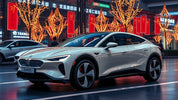
China's EV Boom: Global Market Impact and Future Challenges 🚗⚡
, by Unboxify, 4 min reading time

, by Unboxify, 4 min reading time
In recent years, electric vehicles (EVs) have taken the automotive industry by storm. Nowhere is this more apparent than in China, where the shift towards electrification has been both rapid and transformative. However, this meteoric rise has not been without its challenges and controversies. Let's dive into the fascinating tale of China's EV boom and what it means for the global market.
Just a few years ago, the sight of EVs on China's roads was a spectacle of cutting-edge technology. Today, however, hundreds of these once-revolutionary vehicles now lie forgotten in the giant clearings of cities like Hangzhou. These EV graveyards symbolize the rapid pace of technological advancement and the resultant obsolescence.
The proliferation of EVs in China is not just a quirk of consumer preference but a result of concerted governmental effort. The Chinese government has invested heavily in this sector, enabling the country to produce twice as many cars as it can sell domestically each year. This oversupply has led to fields filled with unsold new EVs waiting for buyers.
The United States is significantly wary of China's dominance in the EV sector. There are existing worries that cheap, high-quality Chinese EVs could flood the American market, posing a formidable challenge to local automakers.
One of the reasons for China's stronghold in the EV market is its vertically integrated ecosystem. The country has control over key elements such as battery production and lithium reserves, making it a formidable competitor on the global stage.
Chinese automakers are not content with just dominating the local market; they're setting their sights on Europe and beyond. This expansion is set to create heightened competition for European companies as well.
The Chinese EV boom has also attracted tech giants like Xiaomi, primarily known for its consumer electronics. With substantial preorders and an efficient production line, Xiaomi's entrance is a testament to the sector's robust growth.
In a bid to protect local manufacturers, the United States government has decided to impose hefty tariffs on Chinese EVs. This move aims to ensure that the future of EVs remains a homegrown affair.
BYD, one of the front-runners in the Chinese EV market, is exploring ways to bypass U.S. tariffs, including plans to build a factory in Mexico. This strategic move could allow BYD to capitalize on the North American market without facing prohibitive costs.
The global automotive landscape is on the brink of another transformation. After the waves of American and Japanese dominance, Chinese automakers are now knocking on the doors of global markets, challenging the existing order. While the U.S. pioneered the technology, it now struggles to maintain its lead amid this avalanche of Chinese competition.
The race for EV supremacy continues, and the stakes have never been higher. With countries like China taking the lead, the next few years will be critical in shaping the future of global transportation.






